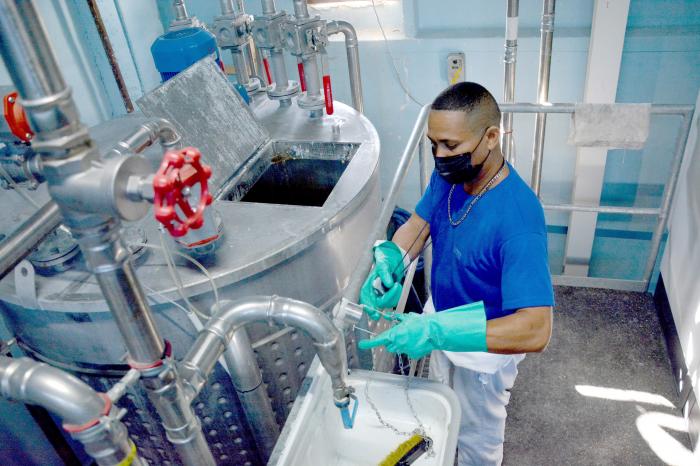
The development of micro, small and medium-sized enterprises (MSMEs) and non-agricultural cooperatives (CNA) cannot be separated from local management and municipal development, since they are convergent interests, pointed out Alejandro Gil Fernández, Vice Prime Minister and Minister of Economy and Planning, during an analysis of these forms of management in the Economic Affairs and Services Commissions.
He highlighted the importance of correcting distortions that impact society and the country's monetary environment, and recalled that the Ministry of Economy and Planning (MEP) has a list of unauthorized activities on the basis of which "everything else can be done", while pointing out the importance of putting limits on dollarization, since "our design is based on the Cuban peso as the center of the financial system, and everything we do must go in that direction."
Gil Fernández noted that the work of economic actors is, among other aspects, in the direction of increasing supply and making the national economy competitive.
Joel Queipo Ruiz, a member of the Party Secretariat and head of its economic department, emphasized that the country's economic fabric has changed, although the socialist state company continues to have the greatest weight.
NEW ECONOMIC ACTORS
Based on the results of the control carried out on 35 MSMEs and CNAs, Johana Odriozola Guitart, Vice Minister of the MEP, offered an assessment of the process of training new economic actors and the main difficulties encountered.
She highlighted that, at the close of May 9, there were 3,292 approved economic actors in Cuba, of which 3,191 private and 51 state MSMEs, as well as 50 CNAs.
He also said that at the end of April the National Tax Administration Office reported that more than 8,000 self-employed worker licenses have more than three contracted workers, which requires, according to current regulations, that they be reconverted into MSMEs or cooperatives.
Among the positive aspects that were mentioned, based on the exchange with these actors, is the digitization of the approval process, which has taken place in an agile and transparent manner; the consequences of being legal persons; the contributions they can offer to employment rates; that a more flexible regulatory framework has been approved; the accompaniment of certain institutions and territories in this "birth"; as well as the possibility of deciding which legal form to adopt, taking into account the characteristics of the business and the particular interests.
The main dissatisfactions refer to the non-existence of a legal mechanism for the purchase of foreign currency, which does not happen, affirmed Odriozola Guitart, as a matter of will, but rather because of the shortage of foreign currency that the country has; and the need to implement procedures to access foreign investment and international collaboration.
On this last issue, she pointed out that work has been going on and there are quite elaborate proposals with a level of consensus, in order to temper these procedures and that they contemplate the new actors.
Other concerns are in the refusal to lease state premises or the excessive prices that are asked for these establishments, even when they require significant investments; the refusal of some entities to establish contracts with the new actors, almost always due to ignorance of the current legal norms; as well as the delays and cumbersome procedures in the granting of licenses.
Accessing bank financing, streamlining import processes, non-conformity with the definitions of legal advice, and the commitment to greater training in economic, accounting and legal issues, also require a differentiated view, from the MEP and other State agencies, assured.
STRENGTHEN THE TREASURY
Improving the management of public finances in the country and, within this mechanism, the operation of the treasury system due to its close relationship with the execution of the State Budget, was the call made by Vice Prime Minister Alejandro Gil Fernández, in his intervention in the Economic Affairs Commission of the National Assembly.
He also highlighted that currently Cuba is advancing towards the decentralization of the territories, with the intention that the resources are generated and managed closer to where the economic fact takes place. However, he warned, the path towards that autonomy generates greater responsibility and competence to assimilate the new functions.
Consciously evaluating and revising employment in the budgeted activity, which accounts for 48% of the Island's labor force, and today generates the main expenses, was another observation by Gil Fernández. It is not a question, he indicated, of cutting activities in the budgeted sector or freezing vacancies, but of each one efficiently managing these roles and not contributing to the staff becoming oversized.
He referred to the increase in monetary liquidity currently in the hands of the population, which puts pressure on supply and influences inflation; and the necessary control of public resources and management of the State Budget, "to advance in the economic recovery of the country."
In this regard, Meisi Bolaños Weiss, Minister of Finance and Prices, stressed that the treasury system is vital for the execution of the Budget, and that effective control must be applied in its management.
She stressed that the immobilization of money in the bank accounts of budgeted units; the inadequate execution of the contracts, which leads to the generation of accounts payable; the expense of the salary in the budgeted activity, even reaching 50% and 60% in some municipalities; as well as the risk that the use of cash implies and that pay slips are violated or falsified, are some of the deficiencies that today make a dent in this system.
By: Granma Newspaper
